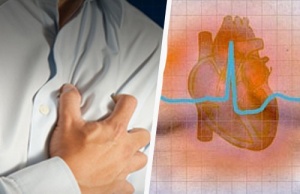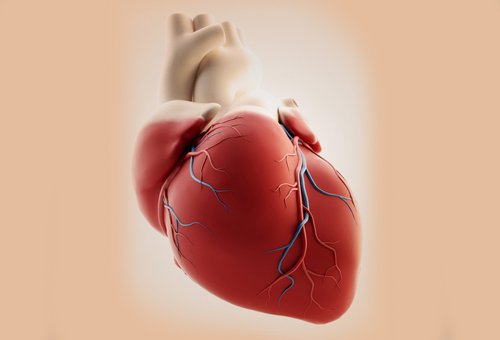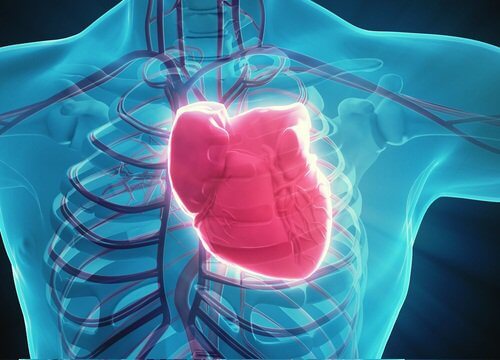Heart Arrhythmias: Symptoms and Consequences


Written and verified by psychologist Valeria Sabater
Are you feeling fatigued or is your heart racing? Most of the time these things are of no great consequence to your health, but sometimes they can be an indication of heart problems. In this article, we invite you to expand your knowledge of heart arrhythmias.
What are heart arrhythmias?

At some point in your life, you might have had an electrocardiogram. When you have one, you can see a graphical representation of your heart’s electrical activity, and a specialist will evaluate the duration of your cardiac cycle and the overall function of your body’s electrical impulse system.
Read more here: Four Exercises that Help Your Heart Function
Your doctor will be able to tell you if your heart arrhythmia is causing a mild or serious alteration of your normal heart rate, which can weaken it in the long run.
Types of heart arrhythmias
- Sinus bradycardia: When you have this condition, your heart rate tends to be a bit slower than normal and it’s usually not very serious. Sometimes it can result from certain medications.
- Ventricular fibrillation: With this type of arrhythmia, the heart has inadequate electrical activity. It requires immediate medical intervention. It can manifest in younger people who are engaged in a demanding exercise or sport and frequently cause death. It’s a very serious, condition.
The only indicator that you might be prone to this arrhythmia is having a family member or genetic background that predisposes you to it.
- Congenital Long QT syndrome: This is another inherited disease, in which you’ll suffer short and sudden tachycardia and occasionally lose consciousness.
- Atrial fibrillation: About 50% of patients with this type of arrhythmia can go from a normal state to a sudden and violent arrhythmia, with few symptoms that allow you to predict the attack. The only treatment for this is a pacemaker.
- Paroxysmal supraventricular tachycardia (PSVT): This arrhythmia usually manifests after intense exercise. It can last from a few minutes to several hours, then disappear. It’s accompanied by sharp chest pain and can be identified during childhood as a heart muscle abnormality.
Symptoms of heart arrhythmias

Pay attention to the following symptoms that might indicate you have an arrhythmia:
- Palpitations: This is the most common symptom. They may occur after exerting yourself or even while you’re at rest and without provocation. But beware – sometimes you won’t notice the feeling in your chest, but rather in your neck. That’s important to remember.
- Dizziness: This symptom occurs very commonly after physical exertion. First, you might notice an accelerated heart rate, then dizziness that’s followed by a loss of consciousness.
- Dyspnea or fatigue: Maybe you feel the need to take deeper breaths after getting some exercise. You feel a cold sweat and exhaustion coming on. Your head spins and you feel that strong pumping sensation in your chest or neck. This is serious, so be sure to report it to your doctor.
- Heart failure: This symptom is very serious. If this is happening to you, you’ll more than likely be admitted to the hospital with the feeling that you can’t breathe. You feel on the verge of collapse and need immediate assistance.
- Syncope: This occurs when not enough blood reaches the brain and you faint immediately. You might recover quickly and not pay enough attention to it. But remember that all fainting has an origin and you need to inform your doctor, even if you recover and feel just fine.
Guidelines for caring for the health of your heart

You probably already know that most heart problems are caused by inherited genetic factors or even injuries during birth. But you also need to remember that 60% of deaths from heart problems can be prevented by following a healthy lifestyle. Follow these tips:
1. Watch your weight
Always try to maintain a healthy weight and avoid becoming obese.
2. Keep a balanced diet
Include plenty of fish, lean meats, nuts, omega 3 and 6 fatty acids, olive oil, fruits, vegetables, and more in your diet.
3. Keep an eye on your cholesterol
This is very basic because you know that high cholesterol levels damage the body’s veins and arteries.
4. Get plenty of sleep to reduce your risk of heart arrhythmias
Between 7 and 8 hours of sleep a night is good for your health.
5. Get moderate but regular exercise
Try to get out and walk every day, or start running or cycling. Your arteries will be healthier and you’ll lower your blood pressure.
Discover: 6 Tips to Prevent a Heart Attack
6. Reduce your stress and anxiety levels
Take good care of your emotional state and try to reduce the pressures of your daily life along with your worries. Say yes to a healthy lifestyle where you can enjoy time with your friends, family, and all the small things in life. Your heart will thank you for it!
All cited sources were thoroughly reviewed by our team to ensure their quality, reliability, currency, and validity. The bibliography of this article was considered reliable and of academic or scientific accuracy.
- Sanguinetti, M. C., & Tristani-Firouzi, M. (2006). hERG potassium channels and cardiac arrhythmia. Nature. https://doi.org/10.1038/nature04710
- Antzelevitch, C., & Burashnikov, A. (2011). Overview of Basic Mechanisms of Cardiac Arrhythmia. Cardiac Electrophysiology Clinics. https://doi.org/10.1016/j.ccep.2010.10.012
- Grace, A. A., & Roden, D. M. (2012). Systems biology and cardiac arrhythmias. The Lancet. https://doi.org/10.1016/S0140-6736(12)61462-7
- de la Cuerda, R. C., Diego, I. M. A., Martín, J. J. A., Sánchez, A. M., & Page, J. C. M. (2012). Programas de rehabilitación cardiaca y calidad de vida relacionada con la salud. Situación actual. Revista Española de Cardiología, 65(1), 72-79.
- Zayas Molina, R. (2012). Actualización sobre el síndrome de QT largo congénito. Revista Cubana De Investigaciones Biomédicas, 31(2), 0-0. Retrieved from http://scielo.sld.cu/scielo.php?script=sci_abstract&pid=S0864-03002012000200001&lng=es&nrm=iso&tlng=es
- Fu D guan. Cardiac Arrhythmias: Diagnosis, Symptoms, and Treatments. Cell Biochem Biophys. 2015;
- Behere SP, Weindling SN. Inherited arrhythmias: The cardiac channelopathies. Annals of Pediatric Cardiology. 2015.
This text is provided for informational purposes only and does not replace consultation with a professional. If in doubt, consult your specialist.








